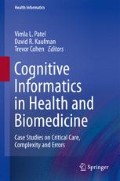Abstract
Increasingly, the acquisition of competence is defined using learning progressions [1]. For conceptual bodies of knowledge, such progressions are reasonably straightforward. They state stages of understanding and capability that people pass through on the path to expertise. Generally, once each stage is fully mastered, performance at that stage is relatively less demanding of cognitive processing resources, leaving some capacity free to notice cues for routine required actions. In mission critical areas, including many areas of medicine, competence includes not only knowing how to deal with situations but also being reliable, while exercising that expertise, in carrying out critical routines (e.g., hand washing) even when overloaded when complex problems that must be solved. This chapter considers the circumstances during the course of progressing to expertise under which there is a danger of routine but critical actions being omitted and then discusses possible ways to minimize the likelihood of critical omissions.
Access this chapter
Tax calculation will be finalised at checkout
Purchases are for personal use only
References
Smith CL, Wiser M, Anderson CW, Krajcik J. Implications of research on children’s learning for standards and assessment: a proposed learning progression for matter and the atomic molecular theory. Meas Interdiscipl Res Perspect. 2006;4:1–98.
Stevens SY, Shin N, Krajcik JS. Towards a model for the development of an empirically tested learning progression. In: Learning progressions in science conference, Iowa City, 2009.
Lesgold A, Rubinson H, Feltovich P, Glaser R, Klopfer D, Wang Y. Expertise in a complex skill: diagnosing X-ray pictures. In: Chi M, Glaser R, Farr M, editors. The nature of expertise. Hillsdale: Erlbaum; 1988. p. 311–42.
Lesgold AM. Acquiring expertise. In: Anderson JR, Kosslyn SM, editors. Tutorials in learning and memory: essays in honor of Gordon Bower. San Francisco: Freeman; 1984. p. 31–60.
Cashon CH, Cohen LB. Beyond U-shaped development in infants’ processing of faces: an information-processing account. J Cogn Dev. 2004;5:59–80.
Siegler RS. U-shaped interest in U-shaped development – and what it means. J Cogn Dev. 2004;5:1–10.
Cohen LB, Chaput HH, Cashon CH. A constructivist model of infant cognition. Cogn Dev. 2002;17:1323–43.
Boshuizen HP, Schmidt HG. On the role of biomedical knowledge in clinical reasoning by experts, intermediates and novices. Cogn Sci. 1992;16:153–84.
Schmidt HG, Rikers RM. How expertise develops in medicine: knowledge encapsulation and illness script formation. Med Educ. 2007;41:1133–9.
Patel VL, Glaser R, Arocha JF. Cognition and expertise: acquisition of medical competence. Clin Invest Med. 2000;23:256–60.
Patel VL, Groen GJ, Arocha JF. Medical expertise as a function of task difficulty. Mem Cogn. 1990;18:394–406.
Hales B, Terblanche M, Fowler R, Sibbald W. Development of medical checklists for improved quality of patient care. Int J Qual Health Care. 2008;20:22–30.
Helmreich RL, Merritt AC, Wilhelm JA. The evolution of crew resource management training in commercial aviation. Int J Aviat Psychol. 1999;9:19–32.
Flin R, O’Connor P, Mearns K. Crew resource management: improving team work in high reliability industries. Team Perform Manag. 2002;8(3/4):68–78.
Author information
Authors and Affiliations
Corresponding author
Editor information
Editors and Affiliations
Rights and permissions
Copyright information
© 2014 Springer-Verlag London
About this chapter
Cite this chapter
Lesgold, A. (2014). Newly-Acquired Complex Performance Competence and Medical Errors. In: Patel, V., Kaufman, D., Cohen, T. (eds) Cognitive Informatics in Health and Biomedicine. Health Informatics. Springer, London. https://doi.org/10.1007/978-1-4471-5490-7_22
Download citation
DOI: https://doi.org/10.1007/978-1-4471-5490-7_22
Published:
Publisher Name: Springer, London
Print ISBN: 978-1-4471-5489-1
Online ISBN: 978-1-4471-5490-7
eBook Packages: MedicineMedicine (R0)

